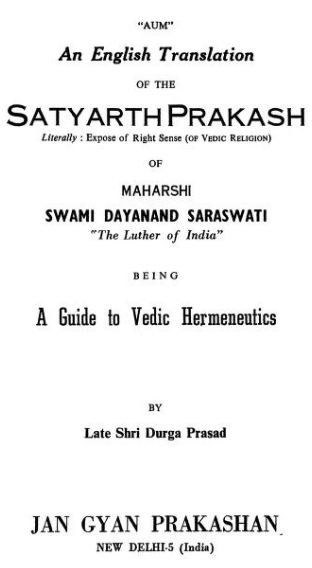‘Satyarth Prakash English’ PDF Quick download link is given at the bottom of this article. You can see the PDF demo, size of the PDF, page numbers, and direct download Free PDF of ‘Satyarth Prakash English Translation Dayanand Saraswati’ using the download button.
The Satyarth Prakash: A Guide To Vedic Hermeneutics PDF Free Download

Satyarth Prakash English
SWAMI DAYANAND SARASWATI (A Life-Sketch)
Swami Dayanand Saraswati, one of the outstanding personalities who S pioneered cultural, religious, and social revival in India in the 19th century,
was born on Phalgun Badi Dashami, 1881 V.S. (12th Feb. 1825 A.D.) at Tankara, a village in the State of Morvi in Kathiawar,
now the railway terminus of the Morvi-Tankara narrow-gauge line on the Western Railway in Rajkot, Gujrat. His father Karshanji Lalji Tiwari, known as Amba Shankar,
was an Audichya Brahmin and a man of affluence and prestige. He was a rich Zamindar and a Banker and a State Official.
He was a staunch Shaivite and wished his son to become a worthy son and follow in his footsteps.
Dayanand bore two names in his childhood: Dayalji (or Daya Shankar) and Mool Shankar, the former being more in use, for it was his nickname.
He had two brothers and two sisters. Dayalji possessed a sharp intellect and a prodigious memory. His faculties of perception and critical analysis were outstanding.
Primary Meanings of Agni, &c.
The right interpretation of the above authorities establishes the fact, that the above names belong to God only, for Aum, Agni, and the like names, properly speaking, denote God, as is shown by
the Vyakarana or grammar, Nirukta or philology, Brahmanas or Vedic commentaries, Sutras or aphorisms and the expositions of scriptures by sages and philosophers.
Hence these meanings should be accepted by all; only that Aum is exclusively the name of God, but Agni and others mean God when the subjects and the epithets indicate prayer, praise, meditation.
Wherefore, it is established that when these names are modified and accompanied by such words as omniscient, omnipresent, holy, eternal, the maker of the world, and the like words, they mean God.
Secondary Meanings of Agni, &c.
But in such passages as
ततो विराडजायत विराजो अधिपूरुषः । श्रोत्राद्वायुश्च प्राणश्च मुखादग्निरजायत तेन देवा प्रयजन्त | पश्चाद्भूमिमयो पुरः | Yajur XXXI तस्माद्वा एतस्मादात्मन प्रकाशः सम्भूतः । श्राकाशाद्वायुः । वायोरग्निः । अग्नेशपः । श्रद्भयः पृथिवी पृथिव्यः प्रोषधयः । श्रोषधिभ्योऽन्नम् । अन्नाद्रेतः । रेतसः पुरुषः स वा एष पुरुषोऽन्नरसमय:
-Tait. Brahmanand V III. 1st An. The words virat, purusha, deva, akasha, vayu, agni, jala, bhumi, &c. denote terrestrial objects; for, wherever creation, preservation, destruction, partial knowledge, non sentient, visible and the like epithets are mentioned, they do not signify God.
The reason is that God is above creation and similar other actions, which in the above authorities are natural actions.
Read: Satyarth Prakash In Hindi
| Author | Dayanand Saraswati |
| Language | English |
| Pages | 624 |
| PDF Size | 55.8 MB |
| Category | Spiritual & Religious |
The Satyarth Prakash Book PDF Free Download
